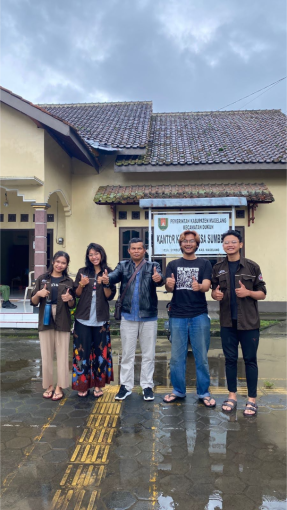
As part of their end-of-semester assignment, Cultural Anthropology students taking the Rural Anthropology course went directly to the field, conducting research to deepen their understanding of the dynamics that occur in rural communities. In particular, the major theme researched by the students was the inequality that occurs in the village. This research was conducted in peri-urban areas around the Special Region of Yogyakarta, with the existence of a ringroad as a barrier to the definition of which area is a village area and which area is an urban area.
Throughout the lecture period, the material presented by Dr. Agung Wicaksono, M.A. as the lecturer of the course discussed a lot about the development of rural dynamics in Java – starting from the colonial era, the new order, reformation, to the present. Since the center of Indonesia’s government has always been in Java, the government’s control over villages in Java has also become a broader reflection of the government within the country. One of the impacts of government policies in rural Java is the emergence of various inequalities. Village officials had more land ownership rights than ordinary people. People who own land then have more capital to reap profits, especially when the New Order government began implementing the Green Revolution program. The landowners who benefited from the increase in capital during the green revolution were people who were influential in the village political sphere. One of the goals of the new order regime in implementing the green revolution program was to pacify the villagers, so that they would not create anti-government movements.
The traces of this inequality can still be seen in rural areas today. With the increase in the number of the newly rich (OKB) following the rise in market prices of some agricultural products in the early 2000s, wealth inequality has become increasingly visible in rural areas. For this reason, the end-of-semester assignment for this Rural Anthropology class was to go directly to the villages, to see the real situation unfolding there. The 76 students who took this class were divided into groups, each with 4-5 members. The villages visited included Hargowilis, Kokap District, Kulon Progo Regency; Gadingsari, Sanden District, Bantul Regency; and Sumber, Dukun District, Magelang Regency.
The group that went to Sumber Village, Magelang, consisted of four Cultural Anthropology students from batch 2023 – Agustina Herawati, Muhammad Syukur, Aisha Nur Fadillah, and Amadeus Abhirama. In a two-day research (November 26-27, 2024), the Sumber group tried to see how inequality arises, especially those related to gender. Sumber is a village on the slopes of Mount Merapi, with the majority of the population working as farmers. There is also a sand mining industry that has developed in recent years. From here, the Sumber group tried to see how the distribution of work and the division of tasks between the people in the village were compartmentalized between women and men. The research was conducted through in-depth interviews with residents and direct observation of the conditions around the village.

